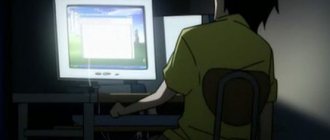History and origin
Until the 1980s, otaku was a form of honorific in Japanese, similar to –sama, -kun or –senpai. This word was often used as a 2nd person pronoun, which is how, for example, it was used by the heroine of the anime “Macro,” which first aired in 1982.
In the modern world, however, the word "otaku" is a slang expression in Japanese that refers to several different concepts:
- a person who is very passionate about something - a hobby can be anything, from manga and anime to games and collecting;
- a person who is passionate about anime or manga;
- There is also a third case - resulting from confusion between the concepts of otaku and hikikomori.
So, otaku - who is it? In its modern meaning, the word was first used in the 1980s, in the works of humorist and writer Akio Nakamori. In 1983, he published a series in Manga Burikko magazine, "Exploring the Otaku," in which he used the term to refer to fans.
At the same time, cartoonists Haruhiko Mikimoto and Shouji Kawamori used the word among themselves as a polite form of address (the same 2nd person personal pronoun) starting in the late 1970s.
Presumably, some members of the subculture did the same (while others moved to less formal communication), and that is why Nakamori chose it (this reason was given by Morikawa Kaichiro, explaining the origin of the term).
The second version of the origin of the concept is the science fiction works of Motoko Arai, who used –otaku as a respectful form of address, and eventually readers adopted this habit.
Stage II. Anime guy.
Soon our friend will begin to settle into his new environment. He will begin to understand the characters, talk more often on topics related to anime, and visit relevant forums and websites. Films for such a person will begin to fade into the background, especially Western ones - he will begin to understand the imperfection of such cinema. And, naturally, the number of anime watched will increase significantly. He will start copying the titles he likes, reviewing them, discussing them with other anime fans, getting into arguments, etc.
Then it will come to manga that are related to your favorite anime, or that are simply well received. However, this element may not have its effect. Not all anime fans like manga, just as not all manga fans like anime.
At this stage, a person may stop, but if there is a feeling that watching your favorite anime is not enough, that you want to master not just animation as entertainment, but to fully understand this hand-drawn world, study it as a culture, then the Anime Guy takes the path of his improvement - to the "Otaku" path.
Modern Japan
In the 90s of the last century, the negative connotation of this word was smoothed out, and the word otaku began to be used differently. Who is it now? The definition has become quite clear - “a fan of something,” an enthusiast who is very passionate about some specific thing. Now this concept refers to fans of anything, it is also often associated with Akihabara and the fashion for “cuteness”.
The Japanese dictionary offers a different interpretation of this word: according to it, “otaku” was originally used in the 80s among friends, denoting a person who is very informed on some issue.
In Japan, this word can be equated with concepts such as “fan”, “expert”, “researcher” or even “obsessed”. All of these terms express different levels of knowledge and interest.
What's the difference? Which word is best depends on what is considered normal in society and what is not so normal.
An archaeologist who is passionate about searching for ancient cities, or Dr. Alan Grant from the movie "Jurassic Park" are therefore considered explorers. They look positive to society. And someone like Professor Brown from Back to the Future would be called an otaku, meaning that his hobby, a time machine, does not fit into the “norm.”
Popular anime that show the otaku image[edit]
- "Lucky Star" (neutral otaku image),
- "Genshiken" (neutral otaku image),
- "Otaku no Video"
- "Densha Otoko (film)" (positive image of an otaku),
- "Perfect Blue" (negative image of idol fans)
- "Boogiepop Phantom" (negative image of geimu otaku),
- "Blood Lad" (neutral otaku image, slightly comical)
- "Welcome to the NHK" (neutral otaku image),
- “Chaos;Head” (a negative image of an otaku, but with a hint of possible recovery from addiction, with constant forced interaction with the real world),
- "Nogizaka Haruka no Himitsu" (positive image of an otaku),
- “Dramakon” (positive image of an otaku),
- "Akihabara@Deep" (Neutral Otaku Image),
- "Ore no Imouto ga Konna ni Kawaii Wake ga Nai" (neutral otaku image).
- "Kami nomi zo Shiru Sekai" (neutral geimu otaku image)
What does a modern otaku look like?
Westerners don't think that being an anime fan is a bad thing. Vice versa. Here, an otaku is most often a person who has “seen everything.” A “walking encyclopedia” on anime or manga (and it doesn’t matter whether a person watches just one genre or all of them), able to advise what to watch based on the tastes of the person asking.
As a result of his hobby, willy-nilly, he becomes an expert in anime genres, and also knows and has watched or read most popular works - the latter trait is typical of otaku. Who it is from the point of view of society is absolutely all the same: it could just as well be a schoolboy, an office worker or an athlete.
In addition, an otaku, even without studying anything specifically, has an understanding of Japanese culture and fashion, both modern and previous eras, and also knows a few words in the language of the Land of the Rising Sun.
At the same time, appearance, habits, and degree of immersion in a hobby can vary greatly. Some otaku collect a collection of CDs with TV series, images of their favorite characters, regularly attend meetings with like-minded people, act out cosplay and know the names of famous voice actors and mangaka authors.
Others are able to watch a 25-episode anime (about 6 hours straight) without stopping. Still others take Japanese language courses to be able to read manga in the original.
Among anime fans there are talented writers who create quite interesting stories - among them Sergey Kim, Konstantin Khrabrykh, Coviello, Ander Tel Sash, otaku Felix. Self-publishing with the participation of these and other authors attracts no less readers than the anime itself.
About terminology[edit]
The terminology of otaku culture is somewhat difficult, since the Japanese often do not need it (for them all these phenomena are “default”). In foreign fandom, Japanese words are used to describe the phenomena of otaku culture, while giving them a more specific meaning than they originally had. Therefore, it often happens that a particular term used in a foreign fandom has no equivalent in Japanese.
The very word “otaku” (Japanese: オタク) in Japanese means “admirer”, “fan”, “geek”, etc. For example, the Japanese can call someone who is interested in railway transport otaku.
The culture as a whole in the external environment is best known by its most visible manifestation as “anime” - a term that is difficult to accept, since this culture is not limited to anime alone. Sometimes the word pore is used, but this term is not broad enough. A related term is “Akiba style” (Japanese: 秋葉系, Akiba-kei
) after the name of an otaku-oriented area of Tokyo.
Classification of Japanese otaku
The Nomura Research Institute (NRI) conducted two in-depth studies, the first in 2004 and the second in 2005. As a result, scientists were able to identify 12 main areas of interest:
- for the largest group, 350 thousand otaku - manga;
- about 280 thousand were fans of pop idols and celebrities;
- 250 thousand considered traveling as their hobby;
- 190 thousand – computer fans;
- 160 thousand were addicted to video games;
- 140 thousand - cars;
- 110 thousand – anime.
The remaining five categories included mobile technology, audio-visual equipment, camera enthusiasts, fashion and trains.
If you look directly at anime fans, you can identify another interesting group - hentai fans.
Among the genres of Japanese animation there is what other nations might call pornography - however, in the Land of the Rising Sun the attitude to the issue is slightly different. Thanks to this, there is also a rather specific group of otaku. Hentai is what is of interest and hobby for these people.
Famous otaku[ | ]
The following popular personalities are known for their love for anime.
- Singer and actress Mari Yaguchi. I would like to cosplay as Usagi Tsukino (“Sailor Moon”)[6].
- Actress Natsuki Kato. Favorite anime is “Slayers”[6]. Her favorite voice actor is Megumi Hayashibara, and due to the fact that the actress is a fan of Hayashibara, she has also become a fan of Rei Ayanami (Evangelion).[7]
- Actress and fashion model Chiaki Kuriyama. Favorite anime: Evangelion, K-On!
,
Black Butler
,
Rozen Maiden
[6]. - Actor Toshiki Kashu. Favorite anime is “Dragon Ball”[6].
- Japanese idol Shoko Nakagawa directly calls herself an otaku[8].
Fanfiction and samizdat
Where there is creativity, there is also fan fiction - this works the same in relation to Western novels or TV series, and in relation to anime and manga. And in some cases it results in samizdat. Otaku create their own works, in the form of drawings, stories or novels, and most often publish them on the Internet or in specialized publications at their own expense.
However, sometimes as a result of such amateur performances a new “star” appears - and the circle begins anew: fan fiction is now created based on the works of a new popular author.
Samizdat otaku is popular, especially among fans of original works. The following plots occur: the main character ends up in the world of the source anime or manga, or the author introduces a new character from the same world, or the author takes the main characters from the original work, but completely changes the plot to his liking.
In the Russian “community” of ficwriters (the largest number of which can be found on lib.ru) there is the most fan fiction based on anime. Not many people write about “Japanese comics” - among them, for example, is the well-known otaku Felix in these circles, whose credits include works in the world of “Bleach” and “Sekirei”.
Stage IV. "Crazy" Otaku
It would seem that what could be higher than the title of “Otaku” for an anime lover? What is the “ceiling” in the development of an anime artist? The fourth stage could have been called anything, but I took “Crazy” for a reason. There is a bit of humor in this word, but personally I would not laugh at such people. Their way of life resembles the life of a madman, but a true anime fan will understand him, but it’s not a fact that he will support him.
So, let’s return to the fate of our test subject, who managed to go from “Newbie” to “Otaku”. He begins to notice that anime acts on him like a drug. He, as soon as a new product catches his eye, without hesitation, buys it, runs home and watches it, without missing a single moment of the series or film. He is capable of watching anime several times until he completely understands it or until he gets bored with it.
His entire apartment is filled with figurines of anime characters, corresponding posters are glued to the walls, the room is not tidy (he doesn’t care about cleanliness), the neighbors/relatives with whom he lives are unhappy, because the voices of anime characters are constantly heard from his locked room.
Such a person forgets about sleep; for him there is no other reality than the world of anime. He binge watches/reads as much anime/manga as he can. At work/school he is not just bored, he literally sleeps at the slightest opportunity.
For such a person, anime becomes a way of life, new releases become the goal of life. All sorts of family, work, financial, personal issues fade into the background before the anime. He will never leave the series halfway, no matter how disgusting it is to him. He will record all the anime on blanks, constantly asking the question “Where should I put them?”
The only friends he will have are anime fans. He will communicate with most of them via the Internet. Anime sites and forums will become a means for him to communicate and receive news from this world. He will pump out a huge amount of anime, not caring about traffic and other, as it seems to him, insignificant problems.
He himself becomes either too emotional or too closed in on himself and in the world of anime. His vocabulary will be reduced entirely to common Japanese expressions. There is a very high probability that such a person will learn Japanese by all means available, at least at the beginner level. He will not have friends among non-anime fans, because he will constantly steer any conversation toward anime topics.
We could discuss such a person for a long time, but I think that what has been discussed here is quite enough to understand that not only is it not worth striving for the title of “Crazy Otaku,” but it is better to avoid it altogether. Perhaps something described here is exaggerated, but, nevertheless, close to the truth. Once you reach the Otaku level, you just need to stop and enjoy what you have. Remember, anime, for most, should remain entertainment, not a way of life,
On the issue of social adaptation
The most famous anime that provoked the emergence of dozens and hundreds of fan fictions are “Naruto”, “Bleach”, “Evangelion”, “Code Geass”, “Shaman King”, “One Piece”. You can add “Black Butler”, “Death Note”, “Fullmetal Alchemist”, “Vampire Knight” to the same list. The aforementioned otaku Felix, for example, wrote several popular works among fans of fan fiction based on the world of “Bleach” - “Captain” and the “Empty” series.
In Japan itself, to be a mangaka (author of manga) means to have a completely respected profession, and, depending on the publishing house or fame, to receive decent pay.
However, as soon as the author begins to receive payment for his work, he ceases to be an amateur. However, he doesn’t stop being an otaku. Felix, whose samizdat online is represented by quite good works, has not yet crossed this line. But, for example, Nadezhda Kuzmina (author of the series about the dragon empress and “Timiredis”) is already publishing her books as a professional writer.
Notes[ | ]
- Brief anime-Russian phrasebook // anime*magazine. - M.: Sakura-press, 2004. - No. 3. - P. 37.
- Clements, Jonathan, McCarthy, Helen.
The Anime Encyclopedia: A Guide to Japanese Animation Since 1917 - 2nd ed. - Stone Bridge Press, 2006. - P. 31. - 867 p. — ISBN 978-1-93-333010-5. - Ivanov B. A.
Introduction to Japanese animation. — 2nd ed. — M.: Cinematography Development Fund; ROF "Eisenstein Center for Film Culture Research", 2001. - P. 230. - 396 p. — ISBN 5-901631-01-3. - Survey about "Roots" of Otaku Lifestyle Published. Anime News Network (May 31, 2007). Access date: May 28, 2011.
- 2011野経済研究所
- ↑ 1234
矢口真里:「セーラームーンになりたい」栗山千明、加藤夏希とオタク全開特別番組 (Japanese). Mainichi Shimbun (June 30, 2009). Access date: October 10, 2009. - (Japanese). Mainichi Shimbun (June 28, 2006). Access date: June 4, 2009. Archived November 5, 2008.
- (Japanese). Mainichi Shimbun (December 8, 2007). Access date: November 1, 2009. Archived May 18, 2008.
Literature[ | ]
- Katasonova E. L.
Otaku: pros and cons // Asia and Africa today. - 2010. - No. 12. - P. 52-58. Archived May 23, 2013. - Azuma H.
Otaku: Japan's Database Animals: [English] / Translated by Jonathan E. Abel and Shion Kono. - University of Minnesota Press, 2009. - 176 p. — ISBN 978-0-8166-5351-5. - Debating Otaku in Contemporary Japan: Historical Perspectives and New Horizons: [English] / Edited by Patrick W. Galbraith, Thiam Huat Kam and Björn-Ole Kamm. — Bloomsbury Academic, 2015. — 240 p. — ISBN 978-1-4725-9497-6.
Excerpt characterizing Otaku
When Prince Meshchersky left, Prince Andrei took Pierre's arm and invited him into the room that was reserved for him. The room had a broken bed and open suitcases and chests. Prince Andrei went up to one of them and took out a box. From the box he took out a bundle in paper. He did everything silently and very quickly. He stood up and cleared his throat. His face was frowning and his lips were pursed. “Forgive me if I’m bothering you...” Pierre realized that Prince Andrei wanted to talk about Natasha, and his broad face expressed regret and sympathy. This expression on Pierre's face angered Prince Andrei; he continued decisively, loudly and unpleasantly: “I received a refusal from Countess Rostova, and I heard rumors about your brother-in-law seeking her hand, or the like.” Is it true? “It’s both true and not true,” Pierre began; but Prince Andrei interrupted him. “Here are her letters and a portrait,” he said. He took the bundle from the table and handed it to Pierre. - Give this to the Countess... if you see her. “She is very sick,” said Pierre. - So she’s still here? - said Prince Andrei. - And Prince Kuragin? – he asked quickly. - He left a long time ago. She was dying... “I’m very sorry about her illness,” said Prince Andrei. – He grinned coldly, evilly, unpleasantly, like his father. - But Mr. Kuragin, therefore, did not deign to give Countess Rostov his hand? - said Prince Andrei. He snorted several times. “He couldn’t get married because he was married,” said Pierre. Prince Andrei laughed unpleasantly, again resembling his father. - Where is he now, your brother-in-law, may I know? - he said. - He went to Peter... “however, I don’t know,” said Pierre. “Well, it’s all the same,” said Prince Andrei. “Tell Countess Rostova that she was and is completely free, and that I wish her all the best.” Pierre picked up a bunch of papers. Prince Andrei, as if remembering whether he needed to say something else or waiting to see if Pierre would say something, looked at him with a fixed gaze. “Listen, you remember our argument in St. Petersburg,” said Pierre, remember about... “I remember,” Prince Andrei hastily answered, “I said that a fallen woman must be forgiven, but I did not say that I can forgive.” I can't. “Is it possible to compare this?...” said Pierre. Prince Andrei interrupted him. He shouted sharply: “Yes, ask for her hand again, be generous, and the like?... Yes, this is very noble, but I am not able to go sur les brisees de monsieur [follow in the footsteps of this gentleman]. “If you want to be my friend, don’t ever talk to me about this... about all this.” Well, goodbye. So you will tell... Pierre left and went to the old prince and princess Marya. The old man seemed more animated than usual. Princess Marya was the same as always, but because of her sympathy for her brother, Pierre saw in her joy that her brother’s wedding was upset. Looking at them, Pierre realized what contempt and malice they all had against the Rostovs, he realized that it was impossible in their presence to even mention the name of the one who could exchange Prince Andrei for anyone. At dinner the conversation turned to war, the approach of which was already becoming obvious. Prince Andrei talked and argued incessantly, first with his father, then with Desalles, the Swiss teacher, and seemed more animated than usual, with that animation whose moral reason Pierre knew so well. That same evening, Pierre went to the Rostovs to fulfill his assignment. Natasha was in bed, the count was at the club, and Pierre, having handed over the letters to Sonya, went to Marya Dmitrievna, who was interested in finding out how Prince Andrei received the news. Ten minutes later Sonya entered Marya Dmitrievna’s room. “Natasha definitely wants to see Count Pyotr Kirillovich,” she said. - Well, how about taking him to her? “Your place is not tidy,” said Marya Dmitrievna. “No, she got dressed and went into the living room,” said Sonya. Marya Dmitrievna just shrugged. - When the countess arrives, she completely tormented me. Just be careful, don’t tell her everything,” she turned to Pierre. “And I don’t have the heart to scold her, she’s so pathetic, so pathetic!” Natasha, emaciated, with a pale and stern face (not at all ashamed as Pierre expected her to be) stood in the middle of the living room. When Pierre appeared at the door, she hurried, apparently undecided whether to approach him or wait for him. Pierre hurriedly approached her. He thought that she would give him her hand, as always; but she, coming close to him, stopped, breathing heavily and lifelessly lowering her hands, in exactly the same position in which she went out into the middle of the hall to sing, but with a completely different expression. “Pyotr Kirilych,” she began to speak quickly, “Prince Bolkonsky was your friend, he is your friend,” she corrected herself (it seemed to her that everything had just happened, and that now everything is different). “He told me then to turn to you...” Pierre silently sniffled, looking at her. He still reproached her in his soul and tried to despise her; but now he felt so sorry for her that there was no room for reproach in his soul. “He’s here now, tell him... so that he can just... forgive me.” “She stopped and began to breathe even more often, but did not cry. “Yes... I’ll tell him,” Pierre said, but... – He didn’t know what to say. Natasha was apparently frightened by the thought that might occur to Pierre. “No, I know it’s over,” she said hastily. - No, this can never happen. I am tormented only by the evil that I did to him. Just tell him that I ask him to forgive, forgive, forgive me for everything...” She shook all over and sat down on a chair. A never-before-experienced feeling of pity filled Pierre's soul. “I’ll tell him, I’ll tell him again,” said Pierre; - but... I would like to know one thing... “Know what?” asked Natasha's gaze. “I would like to know if you loved...” Pierre did not know what to call Anatole and blushed at the thought of him, “did you love this bad man?” “Don’t call him bad,” said Natasha. “But I don’t know anything...” She started crying again. And an even greater feeling of pity, tenderness and love overwhelmed Pierre. He heard tears flowing under his glasses and hoped that they would not be noticed. “Let’s say no more, my friend,” said Pierre. His meek, gentle, sincere voice suddenly seemed so strange to Natasha. - Let’s not talk, my friend, I’ll tell him everything; but I ask you one thing - consider me your friend, and if you need help, advice, you just need to pour out your soul to someone - not now, but when you feel clear in your soul - remember me. “He took and kissed her hand. “I’ll be happy if I’m able to...” Pierre became embarrassed. – Don’t talk to me like that: I’m not worth it! – Natasha screamed and wanted to leave the room, but Pierre held her hand. He knew he needed to tell her something else. But when he said this, he was surprised at his own words. “Stop it, stop it, your whole life is ahead of you,” he told her. - For me? No! “Everything is lost for me,” she said with shame and self-humiliation. - Everything is lost? - he repeated. “If I were not me, but the most beautiful, smartest and best person in the world, and were free, I would be on my knees right now asking for your hand and love.” For the first time after many days, Natasha cried with tears of gratitude and tenderness and, looking at Pierre, left the room.










